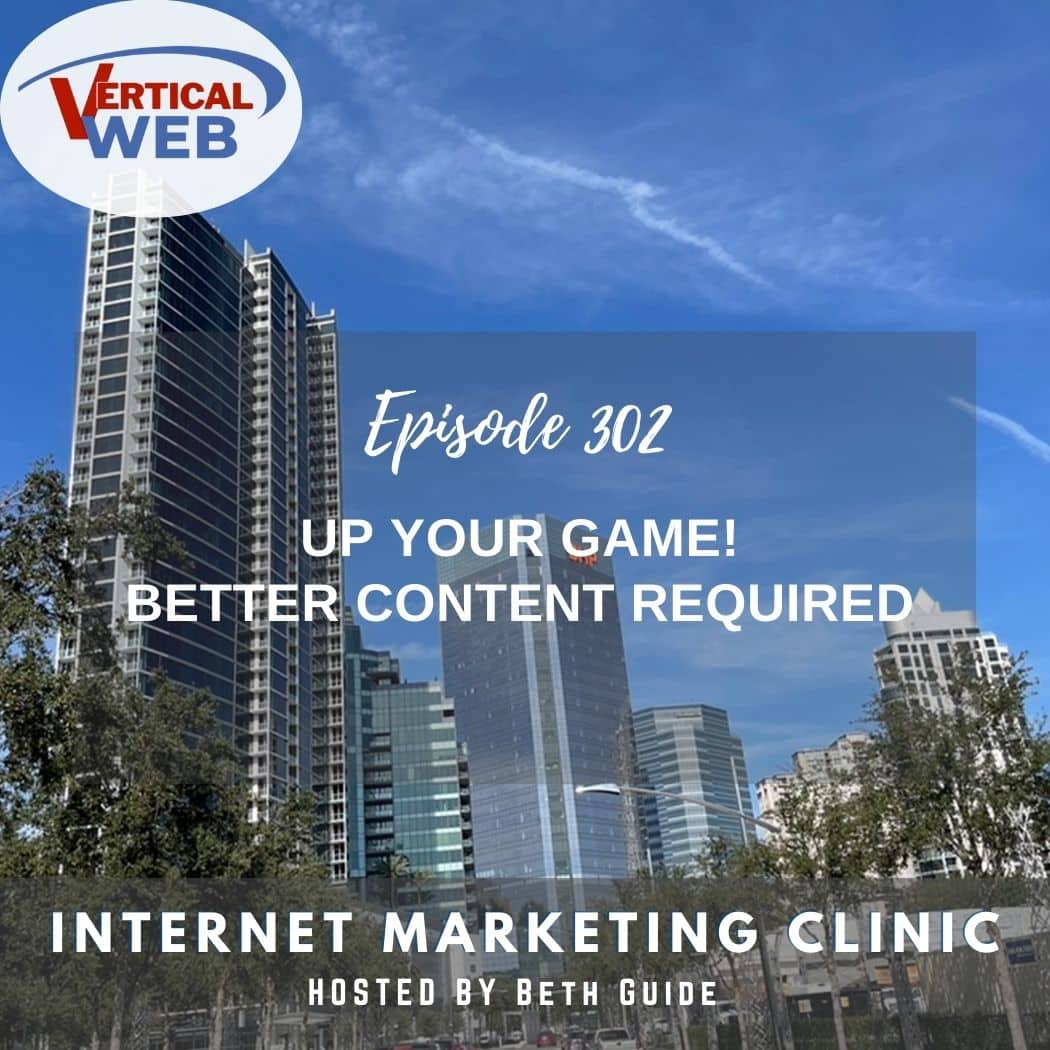Subscribe to Our Podcast Apple Podcasts | RSS
Google has always prioritized content in its rankings, but in the second half of 2022 and into 2023, the search engine giant has gone all-in on content updates. In the past several months, Google has pushed over at least three significant content updates, and its latest includes major work to its search engine content guidelines.
We’ll take a closer look at this latest update and what website owners will need to do in response.
A few notable changes in Google’s newest content update
The bulk of the newest update concerns Google’s E-E-A-T (formerly E-A-T) standard. Before we dive into that, though, here’s a couple other notable changes from the update:
- Google is placing additional emphasis on the content’s author – One of the changes was to Section 2.5, a section that concerns the website’s operator and content creator. This change is actually an addition – a guide that helps quality raters determine a web page’s author. Why is this important to website owners? Because Google is clearly factoring in the content creator’s credibility for ranking purposes. That means business owners will need to invest in building this credibility. That’s where quality content and other page elements – like an author box and bio – come into play.
- YMYL pages are going to get scrutinized extra hard – Google has also added to Section 3.0, a section dedicated to defining quality content. One of the additions asks quality raters to assess whether a page concerns a Your-Money-or-Your-Life (YMYL) subject. YMYL subjects include medical, legal and accounting – subjects where wrong information or advice could do a great deal of harm to the reader. The content quality standards on these pages are higher, given the stakes involved. If you operate in a YMYL industry, it’s extra important that you develop expert-level content that conveys your expertise. It’s also important to remain on top and avoid introducing any topics outside of your field.
Many more changes to the content quality guidelines were made, but the above are of relevance to business website owners. And another major update to be aware of is E-E-A-T, which we’ll address next.
Meet E-E-A-T, Google’s guidelines for creating expert content
While the above changes are noteworthy, it’s the E-A-T rework that’s getting the most attention. E-A-T has been around for years as a guide for quality content, and there’s an extra E to account for now. What was E-A-T (expertise, authoritativeness and trust) is now E-E-A-T (experience, expertise, authoritativeness and trust).
Google developed E-E-A-T to define what end users (the page’s visitors) are looking for when assessing content. As it turns out, users prioritize experience, expertise and authoritativeness when consuming content.
As the website’s owner, it’s your job to ensure your experience, expertise and authoritativeness come through in your site’s content. This is what generates the most important letter in the E-E-A-T acronym – trust.
How can site owners do that? Here’s how Google defines each part of the E-E-A-T formula:
Experience: Does the content creator have direct experience with the subject?
Experience is the new addition to E-A-T, and at first glance, it’s unclear where the line between experience and expertise exists.
Regarding experience, Google wants to know if the content’s author has first-hand experience with what they’re writing about. For many topics, first-hand experience is the most valuable thing the writer bring to the page. Here are some examples:
- A restaurant review: Did the writer eat at the restaurant they’re reviewing?
- Comparing laptops: Did the writer try out both laptops they’re comparing?
- Offering travel advice: Did the writer travel to the place they’re talking about?
As you can see, there isn’t expertise involved here – these are subjects anyone could write on without special knowledge. What’s important is experience.
Expertise: Does the content creator have education, knowledge or skill regarding the subject?
Some topics require years of industry experience, education, training or skill to competently discuss. Technical, scientific, legal, medical, financial, industrial – if you need some kind of professional background to speak on it, then expertise is important.
To develop expertise, your content should go deeper than the typical article written on your subject. It should be specific with technical details and definitions. It should offer original context that non-experts wouldn’t include.
Examples of pages that require high levels of expertise include:
- Technical how-to articles and videos: Is the author a licensed plumber or electrician, or just a DIYer?
- Medical advice columns: Is the author a licensed physician or someone offering their personal experience with an illness or medication?
- Selling a house: Is the author a licensed real estate agent or just someone who sold a house?
With the above examples, you can see the division between expertise and experience.
Authoritativeness: Does the content creator have an established reputation on the subject?
Authoritativeness is expertise, experience and communication all rolled into one. If the content creator has an established professional reputation in the topic they’re writing about, Google is more likely to consider them an authority.
What are some ways to add authority to your website?
- Address expert-level topics on your site
- Add deep, original insight into your content
- Speak from your personal experiences in the industry, across time
- Develop your professional network and become a thought leader in your space
- Answer questions that other people in your field aren’t answering
- Be upfront with your credentials and spotlight them in an author box/bio
If you stick to the above, you’ll build authority over time, especially if you can earn backlinks to your content. Google considers backlinks as markers of trust. Speaking of which:
Trust: Is the content creator someone you can do business with?
Developing trust – from Google and from customers – is a top goal of any business owner. Your content should convince potential customers that your business can be trusted to do what it says.
Google attempts to capture this sentiment by prioritizing certain things on your site. It pays close attention to what’s on your About Us page and any company profile pages. It looks for any evidence on your site that backs your company’s claims (testimonials, case studies, white papers, etc.). The search engine also pays attention to what others are saying about your business, through customer reviews and by assessing your backlink profile.
Why is Google focusing so much on content quality?
With so many content-centric updates and additions, the question is – why? Why is the search engine double and tripling down?
It’s possible that Google is putting in guardrails against AI-generated content. With the emergence of chatbots and AI generated content, there’s a concern that AI users could flood the internet with low quality information. As sophisticated as AI is becoming, it cannot replace an expert human in terms of developing contextually-appropriate content. AI writing has trouble staying on topic, in other words.
Google’s AI-detection methods are superior and the search engine has little trouble flagging AI content when it spots it. You could think of these new content guidelines as a warning, then, against using AI to spin up content pages.
Google is defining its vision for the future of content – can your site keep up?
The SEO game has always relied on content first and Google is reinforcing that message with several recent updates. If you’ve already made expert content a priority for your website, you’re on the right track. If you haven’t prioritized content quality, it will become increasingly difficult to get that first page rank on Google
- Google Leaks and What They Mean for SEO and Small Business from an SEO Expert - July 19, 2024
- SEO Hacks: Easy Ways to Win at SEO - June 8, 2024
- Last Call for Todays Class Get Your Business On the Map – - May 22, 2024


